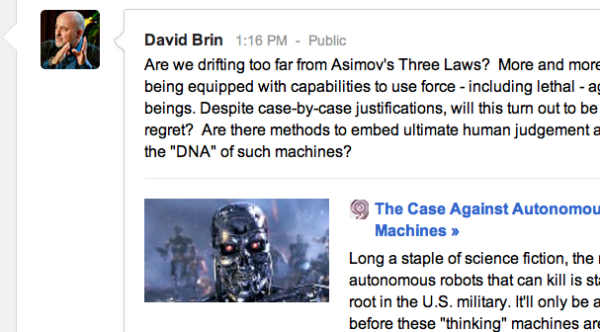I’ve been planning for a while to write a series of posts on this blog about how advances in science and technology have the potential to make certain current jobs carried out by people unnecessary. This topic gets some thoughtful coverage in the media from time to time but usually it’s just short throw away stories on some funny looking robot (ahem…see below). But the bigger picture for people’s careers and the economiy are important to think about as well. That is because if you know technology is being developed which could make your current job disappear in 5 or 10 years you may have time to consider a new career. Or imagine you see on the horizon that 20 years from now we may not need human bus drivers in cities because of self-driving cars. Then you wouldn’t encourage your children or any young person to get into that job for the long term, even if the benefits are great, because it’s fundamentally unstable in the long run due to technology.
So as a public service, and to give me a theme to write about, I’m going to try to regularly post here to raise awareness about advances in science and technology that have the potential to do away with entire careers completely. Or to give it a pithy Twitter hashtag: #MachinesWantYourJob.
What to do about it
Some of these trends are obvious to a lot of people, such as repetitive factory work jobs being replaced by robotics. But a lot of cases aren’t so obvious. Personally, I think people are underestimating how disruptive self-driving cars will be on many jobs once the technological, safety and regulatory kinks are worked out. This may take a long time, but it’s progressing faster than some expected. Also, there is a lot of scientific research and technology development that is not so widely covered or understood by the media, so people don’t realize that some jobs could be just doomed in the long run. Another example is grocery checkouts, the current clumsy self-checkout lines in supermarkets are only a first step. It is perfectly feasible with existing technology to build a supermarket or big box store with no checkout lines at all by using RFID tagged merchandise, QR code printouts from scales and object recognition on digital cameras. No cashiers would be needed, just pillars near the exits to confirm your purchase and pay. It’s seems to be just a matter of time before it’s cheap enough that some store will implement it and do away with those cashier jobs.
Just to be clear, the intention in pointing out these trends is not to necessarily stop them in order to save existing, 20th century style jobs. The intention is to raise awareness about what may be coming and encourage people to prepare themselves for the future, to retool, to consider new careers while working in old ones so that when the hammers falls, they are prepared. Because it is unlikely anything going to stop these changes, and if you want to know you certainly can’t stop them if you don’t see them coming.
A more positive and inspiring way to think about this future as an opportunity to have many careers over your life is summed up much more eloquently than I ever could by this comic on Saturday Morning Breakfast Cereal, take a look.
Ok, Show us the Funny Robots
Entry number one – I hope you weren’t banking on being a noodle cutting chef in a Chinese restaurant, because the robots are all over that:
The best thing about this is how he felt the need to make it look like a 1970s stereotype of a robot. It’s actually really simple, barely a robot at all, anymore than the windshield wipers on your car are.
Now I’m hungry…noodles. mmmm.
See you next time, if you have any ideas for topics on this theme reply in the comments or tweet me @compthink.







